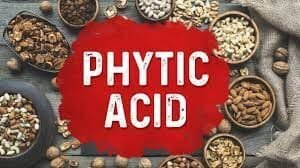Phytic or phytate acid, also known as inositol hexaphosphate (IP6), is a natural compound found in plant-based foods such as grains, nuts, and legumes. It is a storage form of phosphorus that plays an essential role in the plant’s metabolism and growth. In this article, we will explore the sources, benefits, and precautions of phytic acid.

Sources of Phytic Acid:
Phytic acid is found in high concentrations in unprocessed whole grains, legumes, and nuts. It is also found in smaller amounts in vegetables and fruits. The highest sources of phytic acid are:
- Whole grains such as wheat, oats, rice, and corn.
- Legumes such as beans, lentils, and chickpeas.
- Nuts such as almonds, cashews, and peanuts.
Benefits of Phytic Acid:
While phytic acid has received some negative attention for its potential to bind to minerals, it also has several health benefits, such as:
- Antioxidant Properties: Phytic acid acts as an antioxidant and protects the body’s cells from damage caused by free radicals. This may help prevent chronic diseases such as cancer and heart disease.
- Anti-Inflammatory Properties: Phytic acid has anti-inflammatory properties and may help reduce inflammation in the body. This may help prevent chronic diseases such as arthritis and inflammatory bowel disease.
- Potential Cancer Prevention: Phytic acid may help prevent cancer by inhibiting the growth and spread of cancer cells. It may also enhance the effectiveness of chemotherapy and radiation therapy.
- Bone Health: Phytic acid may improve bone health by increasing bone density and reducing the risk of osteoporosis.
Precautions of Phytic Acid:
While phytic acid has several health benefits, it also has some potential drawbacks. Here are some precautions to consider:
- Mineral Absorption: Phytic acid can bind to minerals such as iron, zinc, and calcium, reducing their absorption in the body. This may be a concern for people who consume a plant-based diet or have a deficiency in these minerals.
- Digestive Issues: Phytic acid can also reduce the digestibility of some nutrients, such as proteins and starches, causing digestive issues such as bloating and gas.
- Processing: Processing methods such as soaking, sprouting, and fermenting can reduce the amount of phytic acid in foods and increase mineral absorption. Therefore, it is recommended to consume processed foods rather than raw foods.
In conclusion, phytic acid is a natural compound found in plant-based foods that have several health benefits, including antioxidant and anti-inflammatory properties and potential cancer prevention. However, it may also reduce the absorption of minerals and cause digestive issues in some people. Therefore, it is recommended to consume processed foods and speak with a healthcare professional before making any significant dietary changes.
We hope our readers will be benefited through above article on phytate acid.
Thanks for visiting our blog.
GymBag4U – Your Fitness is Our Passion
